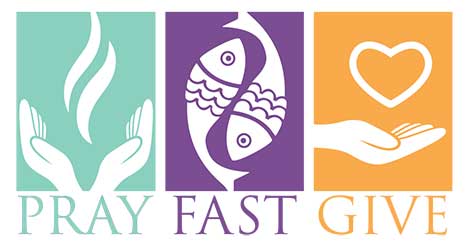We act in faith, knowing that we see only dimly. But living in faith, we act anyway, choosing and doing the best we can. We act and live in confidence that someday we will see face to face, that we will live into the answers. For God's grace embraces our questions as well as our answers and our blindness as well as our vision, just as the sun shines steadily through the night, waiting to illumine the sky at dawn.
~from Wrestling till Dawn by Jean M. Blomquist
Have a great week. Contemplate what you’ll give up—and what you’ll take on—during the Lenten season. Try to move beyond chocolate, dessert, and carbs if you can… What is it that really keeps you from putting God and your neighbor at the center of your life? What false idols control you or influence you in unhealthy ways? How can you grow to be a more loving person? ‘
~ Karen
FAQs… What are the Lenten disciplines?
Traditionally we talk about the three disciplines of Lent: fasting, almsgiving and prayer. Why? The gospel reading for Ash Wednesday draws from the portion of Jesus’ Sermon on the Mount where he teaches about…fasting, almsgiving and prayer. Lent is a time of preparation, a time to break down walls and strip away bad habits, a time to re-focus ourselves and re-turn ourselves towards God, so that when we arrive at Easter, we can reclaim our baptism and sing alleluia with all our heart. So what do these Lenten disciplines mean, and how can they be meaningful for us today?
Fasting:
Currently in the Catholic Church we have only two formal fast days, Ash Wednesday and Good Friday. On these days, we limit ourselves to one proper meal, two small meals and no snacking. We also abstain from meat on those two days, and on all the Fridays of Lent. We fast for different reasons: as a form of penance; to develop self-control and self-discipline; to be in solidarity with those who are hungry and suffering; to better understand what controls us and what we’re ‘addicted’ to; to become more perfect.
We traditionally also “give up” something for Lent. It’s the rare Catholic who didn’t give up chocolate as a kid! But when choosing what to give up, you should ask yourself why you’re choosing what you choose. Are you giving up chocolate just because it’s what you’ve always done? Because it makes you suffer? Or are you giving it up because you’re addicted to it? Perhaps you could give up a bad habit that’s potentially destructive human relationships, like gossiping. Or maybe give up sleeping late, and use some of that time for regular prayer. Maybe you could fast from texting, and push yourself to spend more face-to-face time with your friends, or even write a letter to someone who’s too far away to join you on a coffee date. Or maybe you give up fast food and focus on eating locally grown food instead.
Your fasting is never just for yourself—it should always be outward directed, toward your neighbor or toward God. What is it that keeps you from being a good friend? What is it that keeps you distant from God? What is it that contributes to the on-going suffering in the world? What prevents you from being a good steward of creation?
Almsgiving:
Alms traditionally consist of monetary donations, but they can also include giving your time and your talent and your focused attention. Maybe you can schedule yourself to do a little extra service work during Lent. Or write your Great-Aunt Matilda a letter, or visit someone in the Pines. I once read about a first-grader who gave up ice cream, and then donated that money to a fund in her school cafeteria that will allow kids who can’t afford to buy ice cream enjoy the treat.
The key here is that your giving doesn’t come out of what’s left-over. Like the poor widow in the gospel, our giving comes from all that we start with (money, time, talent)—not what’s left after we’ve spent it all on other more necessary or pleasurable things.
Prayer:
Prayer ultimately is about being in mutual communication with God. You take your concerns, your thanksgivings, your sorrows, your joys to God—and you sit back in silence so that God’s concerns, sorrows, joys, and thanksgivings can fill you. Making time and embracing silence are difficult to do. That’s why prayer is a discipline. There are a multitude of opportunities on campus to help you with this, from Mass to walking the labyrinth to Taize services to bible studies to Thursday Night Worship to walking (iPod-free) on the cross-country trails.
___________________
Karen Soos
Associate Chaplain and Catholic Campus Minister
Davidson College
Campus Box 7196
Davidson NC 28035
704. 894. 2423
Associate Chaplain and Catholic Campus Minister
Davidson College
Campus Box 7196
Davidson NC 28035
704. 894. 2423







